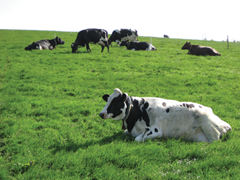DARD budget: what was all the fuss about?
 Positives outweigh the negatives, Richard Halleron reports.
Positives outweigh the negatives, Richard Halleron reports.
Six months ago, the farming industry was considering the prospect of a meltdown in the finances available to DARD (the Department of Agriculture and Rural Development), such was the extent of the speculation at that time concerning the scale of the cuts coming its way. The first ‘scare story’ to hit the headlines was the envisaged closure of the AFBI (Agri-Food and Biosciences Institute) site at Loughgall in County Armagh. This was followed by a host of other rumours including cuts in TB and brucellosis compensation rates and the possible sell- off of Forest Service.
As it turned out, Farm Minister Michelle Gildernew managed to secure a four-year DARD budget deal which, essentially, will see Cafre (the College for Food and Rural Enterprise) and AFBI retained intact. In addition, all the current front-line services provided to farmers should be maintained. The required savings will come in the form of up to 80 job losses within DARD and extensive cuts in service delivery budgets.
But, as is always the case with announcements of this type, the real devil is in the detail. That said, there is ample evidence now available, courtesy of the official draft budget document, that DARD is about to embark on a number of cost cutting exercises that may impact dramatically on the way the department interacts with individual farmers.
A case in point is the confirmation that some animal disease tests may no longer be performed by professional veterinarians. As a consequence, DARD non-veterinary staff can do such testing once legally trained and approved, resulting in a saving on professional costs. This approach may also open new opportunities for the ‘private sector’ to become more actively involved in delivering the various animal health testing programmes, which permeate every aspect of livestock production here in Northern Ireland.
Significantly, the Minister has managed to secure the funding required to deliver Tranche 3 of the Farm Modernisation Programme. This is a support measure, which offers a 40 per cent grant aid to farmers investing in equipment designed to make their business more efficient So all-in-all the last Thursday of January just past was not the worst day farming in Northern Ireland has ever experienced. And to that extent, Michelle Gildernew and her team must be commended for a job well done.
The one really intriguing proposal contained with the DARD budget programme is that which paves the way for DARD to get a new headquarters building, to be located outside the greater Belfast area. Speculation is rife that possible sites at the Maze prison or at Cafre’s Loughry campus are already being assessed with the big move in mind. But whatever site is chosen, it will cost millions of pounds for the new edifice to be put in place. So much for savings! Dundonald House, on the Stormont Estate, has been DARD’s headquarters for the past 40 years.
Under the new arrangements DARD will be expected to save a total of £43 million between now and the end of March 2015. Significantly, the Ulster Farmers’ Union is not losing too much sleep over these budgetary targets. The organisation’s President, John Thompson, seems reasonably content with Michelle Gildernew’s commitment to retain all existing front-line services for farmers. He believes that there continues to be too much red tape and duplication within agriculture, and if farmers see a reduction in red tape as a result of these proposals then that will be a good thing.
Mind you, Michelle Gildernew won’t have much time to rest on her laurels. The CAP reform debate is starting to gather pace. And, here again, the devil will be in the detail. One of Brussels’ top Commission representatives was in Northern Ireland recently. Gwilym Jones made no secret of the fact that our local politicians will be fighting on a number of fronts simultaneously – including the resolution of the EU budget and the detail of the actual CAP review – as they strive to sort out the future of European agriculture. Sounds like a recipe for a classic EU fudge.





